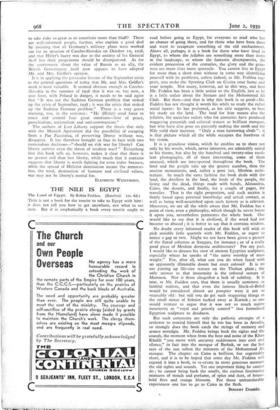THE NILE IS EGYPT
The Land of Egypt. By Robin Fedden. (Batsford. Its. 6d.) THIS is not a book for the tourist to take to Egypt with him: it does not tell you how to get anywhere, nor what to see next. But it is emphatically a book every tourist ought to read before going to Egypt, for everyone to read who has no chance of going there, and for thoie who have been there and want to recapture something of the old enchantment. Above all, perhaps, it is a book for those who have lived in Egypt, to whom the fellahin are something more than items in the landscape, to whom the fantastic discrepancies, the evident procession of the centuries, the glory and the grim- ness are more than mere spectacle. You cannot live in Egypt for more than a short time without in some way identifying yourself with its problems, unless indeed, as Mr. Fedden sug- gests, you make the Sporting Club on Gezira your home and your temple. Not many, however, as in this way, and here Mr. Fedden has been a little unfair to the English, just as he is a little unfair about the Syrians and the Mohammed Ali Club. But then—and that is why this book is so good—Mr. Fedden has not thought it worth his while to study the richer social layers : he has preferred, as his title suggests, to base his study on the land. The land for him means also the fellahin, the nameless toilers who for centuries have produced staggering pyramids and colossal statues or brilliant mosques, but who have also gone on patiently making the earth and the Nile yield their increase. " Only a man harrowing clods ": it is that picture which all the while occupies the forefront of his vision.
It is a grandiose vision, which he enables us to share not only by his words, which, never intrusive, are admirably suited to his theme, but also by the hundred and twenty-nine excel- lent photographs, all of them interesting, some of them unusual, which are interspersed throughout the book. The land and the people take up the greater number, then the ancient monuments, and, rather a poor last, Moslem archi- tecture. In much the same fashion the book deals with the land, the dwellers in the land, the lords of the people, the living and the dead, things made with hands, Alexandria, Cairo, the deserts, and finally, for a couple of pages, the traveller. That is the right proportion, and each section is firmly based upon personal knowledge and actual contact, as well as being well-nourished upon such history as is relevant. Moreover, we are all the while aware that Mr. Fedden has a point of view, even a philosophy, which though he never forces it upon you, nevertheless permeates the whole book. One would like to say that it is civilised, if the word had not become so abused ; it is better to say that it contains wisdom.
No doubt every informed reader of this book will wish to pick amiable little quarrels with Mr. Fedden, or regret to notice a gap or two. Might we not have been given a picture of the fluted columns at Saqqara, for instance ; or of a really good piece of Moslem domestic architecture? For my part, I would like to discuss his view of ancient Egyptian sculpture, especially where he speaks of " the naive worship of mass weight." For, after all, what can you do when faced with an apparently illimitable desert but erect colossi? It is no use putting up life-size statues on the Theban plain ; the only answer to that immensity is the colossal statues of Memnon. Nor is there altogether a lack of subtlety. It is true, as Mr. Fedden says, that there is usually sameness or faithful realism, and that even the famous Sheik-el-Beled would be considered almost art pompier were it not so venerably old : but still you do get such staggering things as the small statue of Sekmet tucked away at Karnak ; so one would venture to argue that it was not so much native incuriosity as " royal and priestly control " that formalised Egyptian sculpture to deadness.
But such comments are only the pathetic attempts of a reviewer to remind himself that he too has been in Arcadia, so strongly does the book catch the strings of memory and arouse nostalgia. Mr. Fedden brings back the sights and the sounds, the moment when from the heat and noise of the Khan Khalili " you move with uncanny suddenness into cool and silence," in fact into the mosque of Barkuk, or see the last rays of the sun soften the minarets- of the Mohammad Ali mosque. The chapter on Cairo is brilliant, but regrettably short, and it is to be hoped that some day Mr. Fedden will expand it into a book, to re-create in more generous measure the old sights and sounds. Yet one important thing he cannot do ; he cannot bring back the smells, the curious fascinating mixtures of stench and perfume, of spice and dust, of house- hold fires and orange blossom. For those untranslatable experiences one has to go to Cairo in the flesh.
BONAMY DOBRISE.










































 Previous page
Previous page